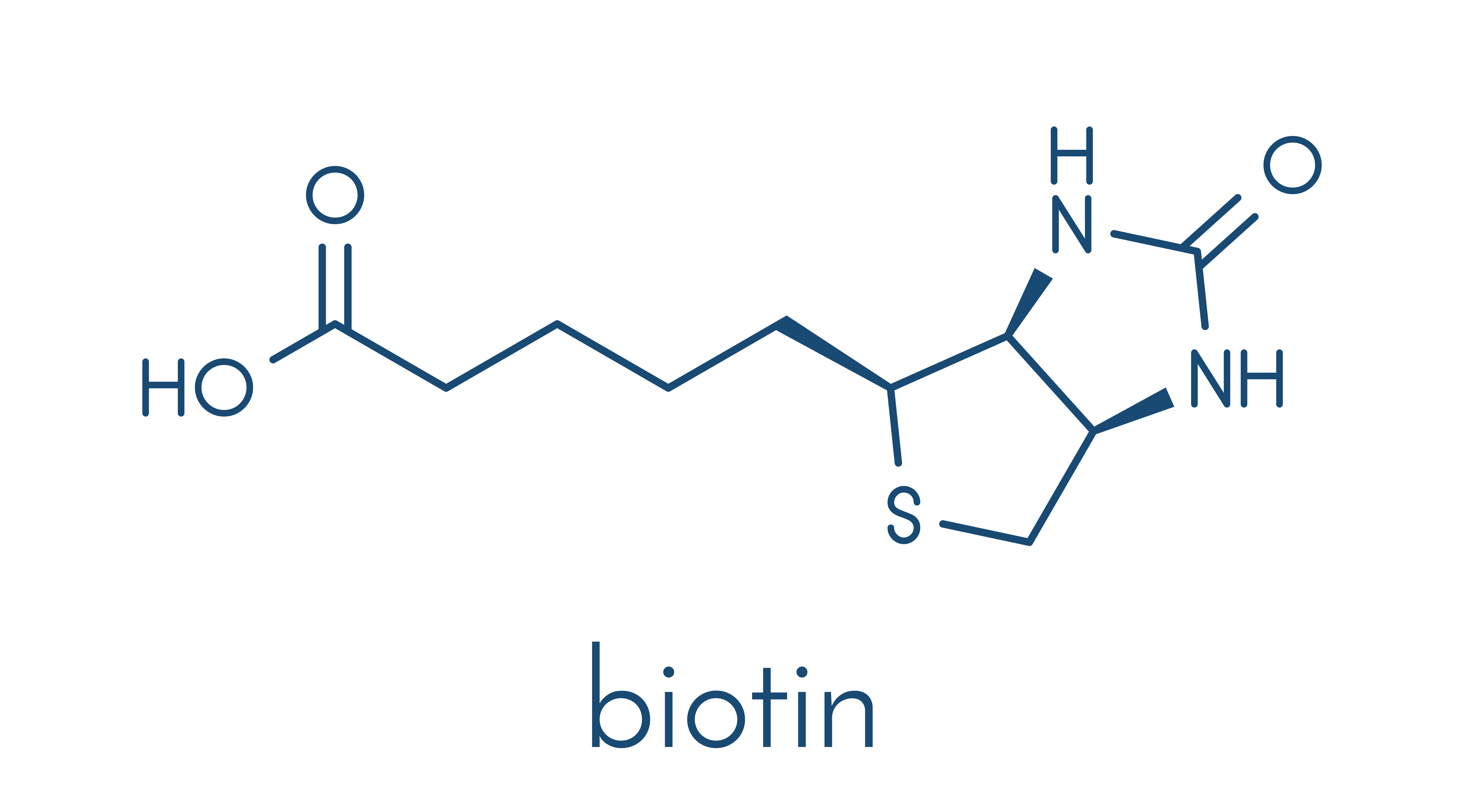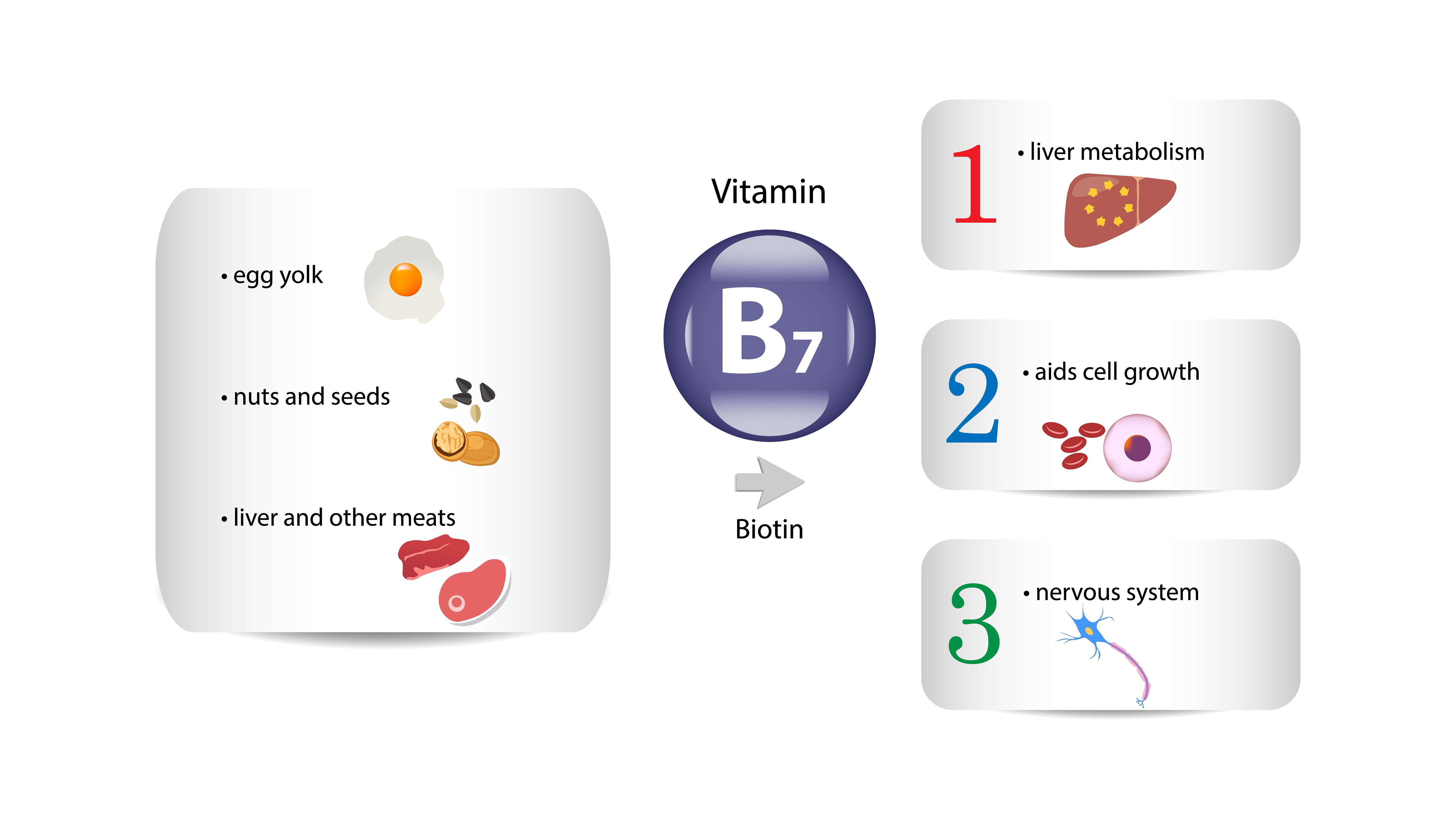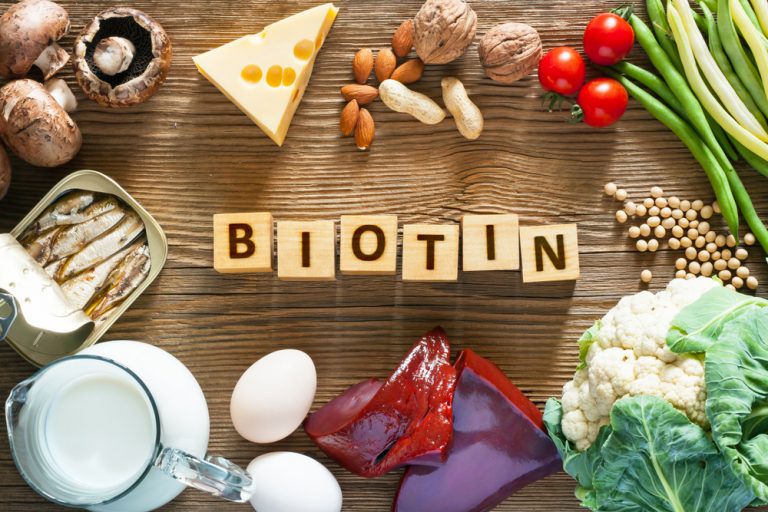Biotin is a B-group vitamin, soluble in water, which helps the body turn food into energy. This is especially important during pregnancy and breastfeeding. In addition, biotin is important for the health of hair, skin and nails. In this article, we will try to give you everything you need to know about biotin, including the seven main health benefits of its regular use!
- What is biotin?
- 1. Biotin plays an important role in the metabolism of macronutrients
- 2. Biotin strengthens nails
- 3. Biotin and health of hair
- 4. Biotin plays an important role during pregnancy and breastfeeding
- 5. Biotin lowers blood sugar
- 6. Biotin has a positive effect on the condition of the skin
- 7. Biotin affects the reduction of symptoms of multiple sclerosis
- Safety and potential side effects
- At the end
What is biotin?
Biotin is one of the B vitamins
Biotin is soluble in water, which means that our body does not store it. It has many important functions in the body, and its excess is excreted in the urine. Its appropriate level is necessary for the proper function of several enzymes known as carboxylases. These biotin-containing enzymes are involved in important metabolic pathways, such as the production of glucose and fatty acids (1).
The commonly recommended dose is 5 mcg (micrograms) per day for infants and 30 mcg for adults. Summing up both of these values, we receive a dose of 35 mcg per day for breastfeeding women. Biotin deficiency is a rare occurrence. However, some groups, such as pregnant women, may experience it in mild forms (2).
Eating raw eggs can cause a shortage of biotin (however, you would have to eat a lot of raw eggs for a long time to do this). Raw egg whites contain a protein called avidin, which binds to biotin and prevents its absorption. Avidin is deactivated during cooking.
In summary, Biotin is a water-soluble vitamin B, important for normal energy metabolism. The shortage is quite rare, it is sometimes associated with long-term consumption of raw eggs.

Biotin is extremely important for energy production. Several enzymes need it for proper functioning (1).
These enzymes are involved in the metabolism of carbohydrates, fat and protein. They activate key actions in the metabolic processes of the mentioned nutrients.
Biotin plays an important role in:
- Gluconeogenesis: this metabolic pathway allows the production of glucose from sources other than carbohydrates, for example from amino acids. Enzymes containing biotin help initiate this process (3).
- Synthesis of fatty acids: Biotin helps enzymes that activate reactions important for the production of fatty acids (4).
- The breakdown of amino acids. Enzymes containing biotin participate in the metabolism of several important amino acids, including leucine (5).
Summary Biotin helps in energy production. It supports a number of enzymes involved in the metabolism of carbohydrates, fats and proteins.
Brittle nails are weakened and easily split, the plate is prone to injuries and cracks. It is a common condition, it is estimated that about 20% of the world's population suffers from brittle nails (6). Biotin can strengthen brittle nails and improve their condition (7).
In one study, 8 people with brittle nails received 2.5 mg of biotin per day for 6 to 15 months. The thickness of nails improved by 25% in all 8 participants. Their tendency to split (8) also decreased. Another study conducted on 35 people with brittle nails showed that 2.5 mg of biotin daily administered for 1.5 to 7 months strengthened the nail plate in 67% of patients (9). However, these trials were conducted on too small a group of people and further research is needed.
Summary Brittle nails are delicate and easily split or cracked. Biotin supplements can help strengthen nails.
Biotin is commonly associated with accelerated hair growth. In addition, it is believed that it positively affects their condition, the hair is healthier and stronger. Surprisingly, there have been too many studies on this subject. However, a shortage of biotin can lead to hair loss, indicating that this vitamin is important to keep them in good condition (2, 10).
Although it is often sold as an alternative treatment for hair loss, only people with a real deficiency of biotin gain significant benefits from supplementing this component (11).
Summary Biotin strengthens hair and accelerates hair growth. Hair becomes stronger and healthier. This effect is particularly visible in people suffering from its deficiency.
Biotin is extremely important during pregnancy and breastfeeding. These stages of life are associated with an increased need for this vitamin (12, 13).
In fact, it is estimated that up to 50% of pregnant women may develop a mild deficiency of biotin. This means that it may start to affect their well-being, but it is not serious enough to cause noticeable symptoms (14, 15, 16). It is thought that deficiencies occur due to the faster breakdown of biotin in the body during pregnancy (17).
In addition, the main cause of concern is the fact that animal studies have shown that a deficiency of biotin during pregnancy can cause birth defects (18, 19, 20). Nevertheless, remember to always consult a doctor or dietitian before taking supplements during pregnancy and during breastfeeding.
Summary If you are pregnant or breastfeeding, your demand for biotin increases significantly. Up to 50% of women may suffer from a mild deficiency of this vitamin.
Type 2 diabetes is a metabolic disease. It is characterized by high blood sugar and impaired insulin function. NNew researchers investigated how biotin supplements affect blood sugar levels in type 2 diabetic patients. Some evidence indicates that biotin levels in blood may be lower in people with diabetes mellitus compared to healthy people (21).
Studies conducted on diabetic patients receiving biotin gave different results (21, 22). However, in several controlled studies, it was shown that biotin supplements combined with mineral chromium can lower blood sugar levels in some people with type 2 diabetes (23, 24, 25, 26).
Summary In combination with chromium, biotin can help lower blood sugar levels in people with type 2 diabetes.
6. Biotin has a positive effect on the condition of the skin
The role of biotin and its impact on skin health is not well understood. However, it is known that if you have a deficiency of this vitamin (27, 28), you may have red, scaly skin lesions or a rash. Some studies also suggest that biotin deficiency can sometimes cause a skin disease called seborrhoeic dermatitis, also known as cradle cap (29, 30).
The role of biotin in skin health can be related to its effects on fat metabolism. This process is important for the skin and may be disturbed when biotin is lacking (27). There is no evidence that biotin improves skin health in people who do not suffer from the deficit of this vitamin.
Summary Biotin deficient skin problems may occur in people who are deficient in biotin. There is no evidence, however, that vitamin has beneficial effects on the skin of people who are deficient.
Multiple sclerosis (MS) is an autoimmune disease. In MS, the protective coating of nerve fibers in the brain, spinal cord and eyes is damaged or destroyed (31). This protective cover is called myelin, and biotin is considered an important factor in its production (32). Pilot studies conducted in 23 people with progressive MS examined the use of high doses of biotin. Over 90% of participants showed some degree of clinical improvement and reduction of symptoms (33).
While this application requires much more research, at least two randomized, controlled trials were conducted in people with progressive MS. Recent results have not yet been published, but their promise is promising (34, 35, 36).
Summary High doses of biotin may be helpful in treating multiple sclerosis, a serious disease that affects the central nervous system.
Safety and potential side effects
Biotin is considered very safe. Even mega doses up to 300 milligrams a day for the treatment of multiple sclerosis did not lead to side effects (33). For this purpose, 300 milligrams is 10,000 times more often recommended for adult doses of 30 micrograms. Because it is a water-soluble vitamin, excess amounts are excreted in the urine.
However, there are reports of a high dose of biotin causing strange effects in thyroid tests, so you should take this into account before using it (37).

At the end
Biotin is a B group vitamin that plays a key role in the metabolism of carbohydrates, fat and protein. Many of her potential health benefits are based on weak evidence. Nevertheless, it can be important for the skin, hair and nails. In addition, pregnant or breastfeeding women may require more biotin. There are also studies on whether high doses will be effective when treating multiple sclerosis.






